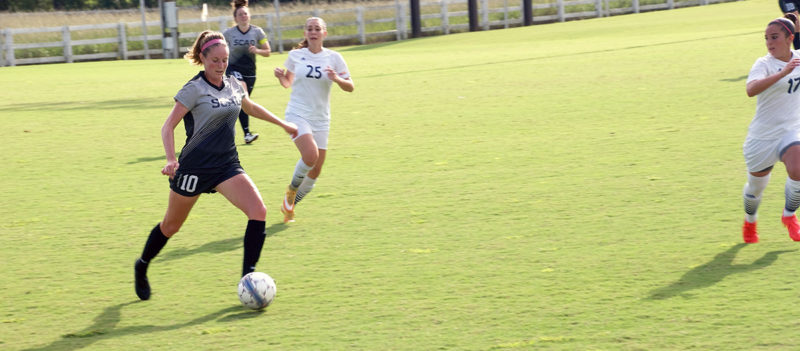I was diagnosed with Crohn’s disease at the age of 15, but I didn’t let that stop me from chasing my dreams of playing collegiate soccer.
After diagnosis, I continued to participate in sports and other physical activities just like any other healthy individual. And I currently play on the Women’s NAIA collegiate soccer team as a defender. Looking back, I’ve learned some tips along the way to continue performing at my best. If you have IBD, here are a few ideas to help you prepare for upcoming sporting events
HANDY CHECKLIST: PLAYING SPORTS WITH IBD
Before the Game
As you’re choosing a college, don’t let IBD keep you from leaving home. You can go to school anywhere and successfully manage your condition. As you’re planning visits to potential colleges, make sure to:
- Inform your coaches and teammates of your disease. Having people that are aware of your condition is very important because you can’t always perform at your very best when you aren’t feeling well. If aware, coaches can better understand what you’re going through on a daily basis, which will make playing sports with IBD easier.
- Over-hydrate and eat foods that are right for you. Hydration is an important aspect of caring for yourself when you have IBD. Make sure to drink lots of fluids before, during, and after sporting events. Eat foods that you know will sit well with you and not cause GI symptoms during games or practice. Also choose food that will give you enough energy to perform at your best.
- Get extra sleep and take all medications on schedule. When you have IBD, you have more periods of fatigue than a healthy person. So be sure to get extra sleep when active in sports, as you may get tired easier. Remember to take all of your medications with you if traveling out of town for sporting events. And take any recommended vitamins to stay in tip-top shape.
- Relax and try not to over-stress. We all know stress is a trigger for IBD. So find what techniques work for you to manage stressful situations like sporting events. Whether it’s deep breathing exercises, listening to music, or playing a game on your phone, find what you like and use it to prepare before events.
During the Game
- Hydrate, Hydrate, Hydrate! Drink plenty of water and/or electrolyte drinks during breaks, timeouts, and halftime. If it is very hot outside, you should drink even more than usual.
- Keep sugar snacks available for energy. Gummy bears or honey sticks are a quick snack that can boost your sugar level if you start to feel fatigued. These can help you at halftime to get through the second half and finish out the game strong!
After the Game
- Eat and drink soon after. Be sure to have a nutritious meal and more fluids soon after the sporting events to regain your energy. You may need soda or a beverage with caffeine as well.
- Take care of your body! Take care of your body after the matches (ex. stretching, ice baths, heating, and foam rolling) because it will take your body much longer to recover than a typical person. By giving your body the extra care and attention it needs, you can be back on the field just as quickly as people who don’t have IBD. Preparation for the next event is an important next step! It’s important to note that when your body doesn’t feel well it’s hard to focus in school – so take care of yourself.
To learn more about our Division of Gastroenterology, Hepatology and Nutrition, or to schedule an appointment, please call 513-636-4415 or email us at gastro@cchmc.org.






Wow! What an amazing young woman. Thanks for sharing your experiences.